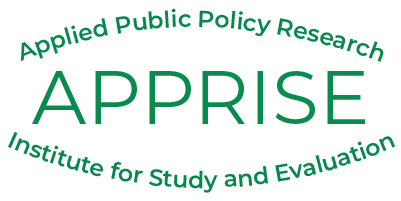RESEARCH AREAS
LOW-INCOME USAGE REDUCTION | BILL PAYMENT ASSISTANCE | RENEWABLE ENERGY PROGRAMS | MARKET TRANSFORMATION
Market Transformation Programs
Market Transformation programs promote the manufacture, purchase, and use of energy-efficient technologies through customer, manufacturer, and installer education, incentives, rebates, and tax credits. The goals of these programs are to overcome market barriers to the adoption of energy efficient technologies. APPRISE conducts research and evaluation of market transformation programs, including baseline documentation, implementation evaluation, assessment of the energy usage impacts, and evaluation of free ridership and spillover effects.

Market Transformation Program Evaluation Activities
Process Evaluation includes reviews of program procedures; interviews with program staff, contractors, and trade allies; evaluation of program materials; and evaluation of training protocols.
Impact Evaluation involves estimation of the impact of services and measures on customer usage, utility demand, and the savings-to-investment ratio. The impact evaluation also assesses the impact of the program on market penetration of energy efficient technologies.
Survey Research includes program administrator, contractor, and customer surveys. Baseline customer surveys may document pre-program awareness and use of energy efficient technologies. Follow-up customer surveys may document changes in knowledge and use of energy efficient technologies and satisfaction with program services and benefits.
Data Tracking includes analysis of data system needs, reviews of existing program data management systems, and recommendations for improvements to existing data systems to facilitate program management, reporting, operations, and evaluation.
Needs Assessment includes analysis of utility and public-use data to determine the savings potential from proposed or planned market transformation programs.
Performance Measurement includes development and measurement of indices that correspond to program goals and objectives. For example, the indices may include number of program participants, change in awareness and use of particular energy efficient technologies, or percentage reduction in energy usage.
Economic Analysis is the measurement of the program’s impact on the economic activity in the state, region, or nation. Energy efficiency investments may have a greater impact on economic activity than other potential investments because they are labor intensive, and a large portion of the expenditures are made within the local area. We use economic multipliers and program expenditures to estimate the economic impact of the program in the geographic area of interest.
Non-Energy Impact Analysis includes assessment of the program’s impact on the economy, job opportunities, emissions, community awareness of energy efficiency opportunities, and health and safety.
APPRISE Market Transformation Program Research and Evaluation
Below we provide a few examples of some of our recent market transformation program research and evaluation projects. Click the tabs below to learn more about these projects, or see here for a full list of projects in this topic area.
APPRISE supported the New Jersey Board of Public Utilities (BPU) in research to assess the economic impacts of New Jersey’s Clean Energy Programs. APPRISE’s work included a survey with participants in New Jersey’s Clean Energy program to assess market characteristics, qualify the nature and number of jobs created in New Jersey, and to better understand the State’s clean energy economy. The project also included in-depth interviews with companies that participate in New Jersey’s Clean Energy economy to develop additional information on the perception of these programs and future clean energy plans.
PGW’s Home Rebate Program provides incentives to residential customers and participating Conservation Service Providers (CSPs) who complete comprehensive natural gas energy efficiency retrofits. Financial incentives are designed to encourage customers and CSPs to pursue as many cost-effective energy efficiency measures as possible and achieve at least twenty percent energy savings on average for the program. The market study and impact evaluation included interviews with program administrators and CSPs, in-depth interviews with partial and full program participants, analysis of the measures installed, assessment of the impact of the program on natural gas usage, and estimation of the program’s realization rate and cost-effectiveness.
APPRISE partnered with two natural gas utilities in the Northeast to study current thermostat technology, setback behavior, and opportunities for smart thermostats. A survey was conducted with a random sample of 385 residential customers to develop a better understanding of which households may benefit from smart thermostats and assess the opportunities for energy savings. The survey found that there is a great opportunity for smart thermostats, as only four percent of respondents had a Wi-Fi connected thermostat, but 74 percent had the technology needed for a smart thermostat. Lower income households may present the greatest opportunity for savings with smart thermostat technology. Over half of these customers had the needed technology, but they were less likely to have programmable thermostats. Households show opportunities for benefitting from smart thermostats that adjust to their usage preferences, as about half of the respondents reported frequent manual adjustment of programmable thermostats. Many reported that they would make extensive use of smart thermostat features if they were available. Programs and incentives could potentially have a large impact on the adoption of smart thermostats.
The New York State Energy Research and Development Authority (NYSERDA) is conducting a study about the energy management practices, priorities, and needs of companies that operate in the industrial and manufacturing sectors. APPRISE supported this work with a baseline Continuous Energy Improvement (CEI) Survey that gathered information about the penetrations of CEI in industrial and manufacturing facilities in New York State. APPRISE conducted telephone interviews with management-level contacts to collect information on energy management attitudes, planning and implementation of strategic energy management, barriers to and interest in strategic energy management, and drivers in business decisions. The survey helped NYSERDA understand how these companies and facilities manage their energy use, what resources they have and they need, and how NYSERDA can design programs to assist these facilities in achieving greater efficiency and reduced costs.
New Jersey Natural Gas’ (NJNG) SAVEGREEN Project offers rebates and financing incentives to fund energy efficiency projects for residential and commercial customers. APPRISE is on a contractor team to evaluate NJNG’s operations and ensure that the programs are meeting the energy savings reduction targets outlined in New Jersey’s 2018 Clean Energy Act. APPRISE is responsible for the Home Performance with Energy Star and Moderate Income Weatherization Process and Impact Evaluations. The research will include NJNG and trade ally interviews, participant surveys, and analysis of the natural gas and electric usage reduction that is attributed to these programs.
